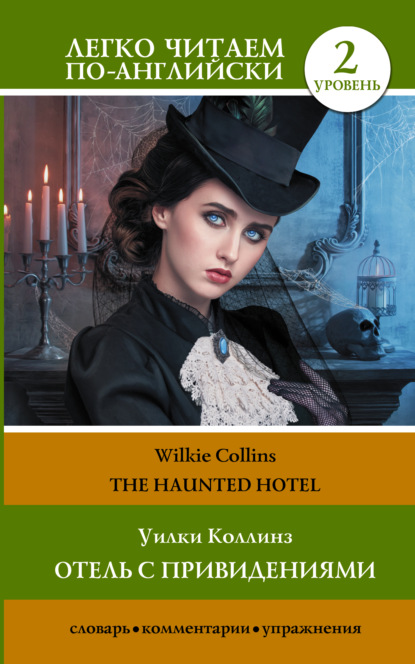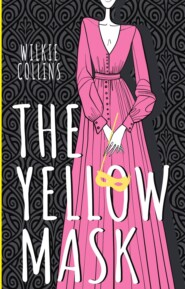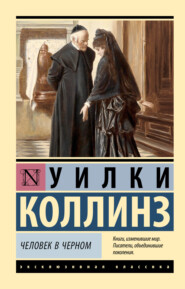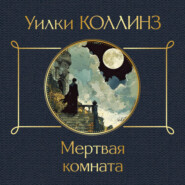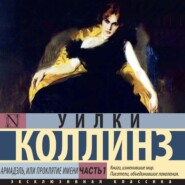По всем вопросам обращайтесь на: info@litportal.ru
(©) 2003-2024.
✖
The Haunted Hotel / Отель с привидениями
Настройки чтения
Размер шрифта
Высота строк
Поля
It was the last month of the year 1860. The commission of inquiry was already at work. On the 10th of December, the term for which the late Lord Montbarry had hired the Venetian palace, expired. Lady Montbarry’s lawyers advised her to leave for London. Baron Rivar will accompany her to England, but will not remain in that country. The Baron, ‘well known as an enthusiastic student of chemistry,’ heard of certain recent discoveries in the United States, and was anxious to investigate them personally.
Mr. Troy duly communicated these items of news to Mrs. Ferrari, whose anxiety about her husband made her a frequent visitor at the lawyer’s office. She attempted to relate the news to her good friend and protectress. Agnes steadily refused to listen, and positively forbade any further conversation relating to Lord Montbarry’s wife.
‘You have Mr. Troy to advise you,’ she said; ‘and you are welcome to what little money I can spare, if money is wanted. All I ask in return is that you will not distress me. Let me hear nothing more, until I can rejoice with you that your husband is found.’
Chapter VIII
On the 14th the Directors and their legal advisers met for the reading of the report, with closed doors.
‘Private and confidential.
We have the honour to inform our Directors that we arrived in Venice on December 6, 1860. On the same day we proceeded to the palace inhabited by Lord Montbarry at the time of his last illness and death.
We were received with all possible courtesy by Lady Montbarry’s brother, Baron Rivar. “My sister was her husband’s only attendant throughout his illness,” the Baron informed us. “She is overwhelmed by grief and fatigue. What are your wishes, gentlemen? and what can I do for you in her ladyship’s place?”
In accordance with our instructions, we answered that the death and burial of Lord Montbarry abroad made it desirable to obtain more complete information relating to his illness. We explained the law, and we expressed our wish to conduct the inquiry with the most respectful consideration for her ladyship’s feelings, and for any other members of the family.
To this the Baron replied, “I am the only member of the family living here, and I and the palace are entirely at your disposal.” We found this gentleman perfectly straightforward, he was amiably willing to assist us.
With the one exception of her ladyship’s room, we went over the whole of the palace the same day. It is an immense place only partially furnished. The first floor and part of the second floor were the portions of it that had been inhabited by Lord Montbarry and the members of the household. We saw the bedchamber, in which his lordship died, and the small room, which he used as a study. Next to this was a large apartment or hall, the doors of which he kept locked. On the other side of the large hall were the bedchamber occupied by her ladyship, and the dressing-room in which the maid slept previous to her departure for England. Beyond these were the dining and reception rooms, opening into an antechamber, which gave access to the grand staircase of the palace.
The only inhabited rooms on the second floor were the sitting-room and bedroom occupied by Baron Rivar, and another room at some distance from it, which was the bedroom of the courier Ferrari.
The rooms on the third floor and on the basement were completely unfurnished. We inquired if there was anything to see below the basement. We were informed that there were vaults beneath.
We went down. The vaults were used as dungeons in the old times. Two long shafts of winding construction communicated with the back yard of the palace. The openings were protected by iron gratings. The stone stairs could be closed by a heavy trap-door in the back hall, which was open. The Baron himself led the way down the stairs.
We remarked that it might be awkward if that trap-door fell down and closed the opening behind us. The Baron smiled at the idea. “Don’t be alarmed, gentlemen,” he said; “the door is safe. My favourite study is the study of experimental chemistry – and my workshop is down here.”
These last words explained a curious smell in the vaults, which we noticed. The smell was of a twofold sort – faintly aromatic, in its first effect, but with some after-odour very sickening. The Baron’s furnaces and retorts, and other things, were all there, together with some packages of chemicals. “Not a pleasant place for study,” Baron Rivar observed, “but my sister is timid. She has a horror of chemical smells and explosions.” He held out his hands, on which we noticed that he wore gloves in the house. “Accidents happen sometimes,” he said, “I burnt my hands severely, and they are only recovering now.”
Later we were even admitted to her ladyship’s own room, when she went out. Our instructions recommended us to examine his lordship’s residence, because the extreme privacy of his life in Venice, and the remarkable departure of the only two servants in the house, might have some suspicious connection with the nature of his death. We found nothing to justify suspicion.
As to his lordship’s retired way of life, we conversed on the subject with the consul and the banker. He called once at the bank to obtain money on his letter of credit. He did not accept an invitation to visit the banker at his private residence. His lordship wrote to the consul, as well. We saw the letter, and we offer the copy of it.
“Many years in India have injured my constitution. I don’t go into society; the occupation of my life now is the study of Oriental literature. The air of Italy is better for me than the air of England. Pray accept the apologies of a student and an invalid. The active part of my life is at an end.”
The self-seclusion of his lordship is explained in these brief lines. Nothing to excite a suspicion of anything wrong has come to our knowledge.
As to the departure of the lady’s maid, we have seen the woman’s receipt for her wages. She left Lady Montbarry’s service because she disliked the Continent, and wished to get back to her own country.
The disappearance of the courier Ferrari is, in itself, unquestionably a suspicious circumstance. Neither her ladyship nor the Baron can explain it. We have examined the portmanteau which Ferrari left behind him. It contains nothing but clothes and linen – no money, and not even a scrap of paper in the pockets of the clothes. The portmanteau remains in charge of the police.
We have also spoken privately to the old woman who attends to the rooms occupied by her ladyship and the Baron. Unfortunately, her limited intelligence makes her of no value as a witness. She was willing to answer us; but we could elicit nothing useful.
On the second day of our inquiries, we had the honour of an interview with Lady Montbarry. Her ladyship looked miserable and ill. Baron Rivar, who introduced us, explained the nature of our errand in Venice. After that he discreetly left the room.
The questions which we addressed to Lady Montbarry related mainly, of course, to his lordship’s illness. The answers informed us of the facts that follow:
Lord Montbarry had been out of order for some time past – nervous and irritable. He first complained of illness on November 13. He passed a wakeful and feverish night, and remained in bed the next day. Her ladyship proposed medical advice. He refused to call the doctor. Some hot lemonade was made at his request. The courier Ferrari (then the only servant in the house) went out to buy the lemons. Her ladyship made the drink with her own hands. Lord Montbarry had some hours of sleep afterwards. Later in the day, Lady Montbarry rang for Ferrari. The bell was not answered. Baron Rivar searched for the man, in the palace and out of it, in vain. This happened on November 14.
On the night of the 14th, the feverish symptoms returned. They were perhaps attributable to the annoyance and alarm caused by Ferrari’s mysterious disappearance.
On the 15th (the day on which the old woman first came to do the housework), his lordship complained of sore throat, and of a feeling of oppression on the chest. On this day, and again on the 16th, her ladyship and the Baron entreated him to see a doctor. He still refused. “I don’t want strange faces about me,” that was his answer.
On the 17th he was so much worse that it was decided to send for medical help whether he liked it or not. Baron Rivar, after inquiry at the consul’s, secured the services of Doctor Bruno, an eminent physician in Venice. The doctor’s own report is attached.
“My medical diary informs me that I first saw the English Lord Montbarry, on November 17. He was suffering from a sharp attack of bronchitis. Some precious time was lost. So he was in a delicate state of health. His nervous system was out of order – he was at once timid and contradictory. When I spoke to him in English, he answered in Italian; and when I tried him in Italian, he went back to English. Then he could only speak a few words at a time, and those in a whisper.
I at once applied the necessary remedies. Copies of my prescriptions (with translation into English) accompany the present statement.
For the next three days I was in constant attendance on my patient. Lady Montbarry was indeed a very devoted wife. She did not allow anybody to attend on her husband but herself. Night and day this estimable woman was at his bedside. In her brief intervals of repose, her brother watched the sick man in her place. This brother dabbled in chemistry; and he wanted to show me some of his experiments.
Up to the 20th, then, things went well enough. I was quite unprepared for the disastrous change that showed itself, when I paid Lord Montbarry my morning visit on the 21st. He relapsed, and seriously relapsed. I examined him to discover the cause. I found symptoms of pneumonia. He breathed with difficulty. Lady Montbarry suggested a consultation with another physician. Her ladyship instructed me to get the best medical opinion in Italy. The first and foremost of Italian physicians is Torello of Padua. He arrived on the evening of the 21st, and confirmed my opinion about pneumonia, and that our patient’s life was in danger. He approved of my treatment. He made some valuable suggestions, and he deferred his return to Padua until the following morning.
The disease was steadily advancing. In the morning Doctor Torello left. ‘I can be of no further use,’ he said to me. ‘Nothing can help this – and he must know it.’
Later in the day I warned my lord that his time had come. Lord Montbarry received the news with composure, but with a certain doubt. He whispered faintly, ‘Are you sure?’ It was no time to deceive him; I said, ‘Positively sure.’ He waited a little, and then he whispered again, ‘Feel under my pillow.’ I found under his pillow a letter, sealed and stamped, ready for the post. His next words were audible: ‘Post it yourself.’ I answered, of course, and I did post the letter with my own hand. I looked at the address. It was directed to a lady in London. The street I cannot remember. The name I can perfectly recall: it was an Italian name: ‘Mrs. Ferrari.’
That night my lord nearly died of asphyxia. He lingered in a state of insensibility until the 25th, and died on the evening of that day.
As to the cause of his death, it seems simply absurd to ask the question. Bronchitis, terminating in pneumonia. Doctor Torello’s own note is added here to a duplicate of my certificate.”
Doctor Bruno’s evidence ends here.
Lady Montbarry can give us no information on the subject of the letter which the doctor posted at Lord Montbarry’s request. When his lordship wrote it? what it contained? why he kept it a secret from Lady Montbarry (and from the Baron also)? why did he write to the wife of his courier? Application to Mrs. Ferrari may perhaps clear up the mystery.
Anyway, it is impossible to dispute the statement on the certificate that his lordship died a natural death. Therefore, we report that there are no valid grounds for refusing the payment of the sum for which the late Lord Montbarry’s life was assured.
We shall send these lines to you by the post of tomorrow, December 10.’
Chapter IX
‘Now, my dear, what do you have to say to me? I don’t want to hurry you; but these are business hours, and I have other people’s affairs.’
Addressing Ferrari’s wife, Mr. Troy looked at the watch on his desk, and then waited to hear what his client had to say to him.
‘It’s something more, sir, about the letter with the thousand-pound note,’ Mrs. Ferrari began. ‘I have found out who sent it to me.’
Mr. Troy started. ‘This is news indeed!’ he said. ‘Who sent you the letter?’
‘Lord Montbarry sent it, sir.’
‘Nonsense! There is some mistake – it can’t be!’ he said.
‘There is no mistake,’ Mrs. Ferrari rejoined. ‘Two gentlemen from the insurance offices told me. They heard of the letter and of the bank-note inside. And they know who sent the letter. The doctor in Venice posted it at his lordship’s request. Go to the gentlemen yourself, sir, if you don’t believe me. They asked me why Lord Montbarry had written to me and sent me the money. I said it was like his lordship’s kindness.’
‘Like his lordship’s kindness?’ Mr. Troy repeated, in amazement. ‘A very pretty explanation! What did your visitors from the insurance offices think of it?’
Mr. Troy duly communicated these items of news to Mrs. Ferrari, whose anxiety about her husband made her a frequent visitor at the lawyer’s office. She attempted to relate the news to her good friend and protectress. Agnes steadily refused to listen, and positively forbade any further conversation relating to Lord Montbarry’s wife.
‘You have Mr. Troy to advise you,’ she said; ‘and you are welcome to what little money I can spare, if money is wanted. All I ask in return is that you will not distress me. Let me hear nothing more, until I can rejoice with you that your husband is found.’
Chapter VIII
On the 14th the Directors and their legal advisers met for the reading of the report, with closed doors.
‘Private and confidential.
We have the honour to inform our Directors that we arrived in Venice on December 6, 1860. On the same day we proceeded to the palace inhabited by Lord Montbarry at the time of his last illness and death.
We were received with all possible courtesy by Lady Montbarry’s brother, Baron Rivar. “My sister was her husband’s only attendant throughout his illness,” the Baron informed us. “She is overwhelmed by grief and fatigue. What are your wishes, gentlemen? and what can I do for you in her ladyship’s place?”
In accordance with our instructions, we answered that the death and burial of Lord Montbarry abroad made it desirable to obtain more complete information relating to his illness. We explained the law, and we expressed our wish to conduct the inquiry with the most respectful consideration for her ladyship’s feelings, and for any other members of the family.
To this the Baron replied, “I am the only member of the family living here, and I and the palace are entirely at your disposal.” We found this gentleman perfectly straightforward, he was amiably willing to assist us.
With the one exception of her ladyship’s room, we went over the whole of the palace the same day. It is an immense place only partially furnished. The first floor and part of the second floor were the portions of it that had been inhabited by Lord Montbarry and the members of the household. We saw the bedchamber, in which his lordship died, and the small room, which he used as a study. Next to this was a large apartment or hall, the doors of which he kept locked. On the other side of the large hall were the bedchamber occupied by her ladyship, and the dressing-room in which the maid slept previous to her departure for England. Beyond these were the dining and reception rooms, opening into an antechamber, which gave access to the grand staircase of the palace.
The only inhabited rooms on the second floor were the sitting-room and bedroom occupied by Baron Rivar, and another room at some distance from it, which was the bedroom of the courier Ferrari.
The rooms on the third floor and on the basement were completely unfurnished. We inquired if there was anything to see below the basement. We were informed that there were vaults beneath.
We went down. The vaults were used as dungeons in the old times. Two long shafts of winding construction communicated with the back yard of the palace. The openings were protected by iron gratings. The stone stairs could be closed by a heavy trap-door in the back hall, which was open. The Baron himself led the way down the stairs.
We remarked that it might be awkward if that trap-door fell down and closed the opening behind us. The Baron smiled at the idea. “Don’t be alarmed, gentlemen,” he said; “the door is safe. My favourite study is the study of experimental chemistry – and my workshop is down here.”
These last words explained a curious smell in the vaults, which we noticed. The smell was of a twofold sort – faintly aromatic, in its first effect, but with some after-odour very sickening. The Baron’s furnaces and retorts, and other things, were all there, together with some packages of chemicals. “Not a pleasant place for study,” Baron Rivar observed, “but my sister is timid. She has a horror of chemical smells and explosions.” He held out his hands, on which we noticed that he wore gloves in the house. “Accidents happen sometimes,” he said, “I burnt my hands severely, and they are only recovering now.”
Later we were even admitted to her ladyship’s own room, when she went out. Our instructions recommended us to examine his lordship’s residence, because the extreme privacy of his life in Venice, and the remarkable departure of the only two servants in the house, might have some suspicious connection with the nature of his death. We found nothing to justify suspicion.
As to his lordship’s retired way of life, we conversed on the subject with the consul and the banker. He called once at the bank to obtain money on his letter of credit. He did not accept an invitation to visit the banker at his private residence. His lordship wrote to the consul, as well. We saw the letter, and we offer the copy of it.
“Many years in India have injured my constitution. I don’t go into society; the occupation of my life now is the study of Oriental literature. The air of Italy is better for me than the air of England. Pray accept the apologies of a student and an invalid. The active part of my life is at an end.”
The self-seclusion of his lordship is explained in these brief lines. Nothing to excite a suspicion of anything wrong has come to our knowledge.
As to the departure of the lady’s maid, we have seen the woman’s receipt for her wages. She left Lady Montbarry’s service because she disliked the Continent, and wished to get back to her own country.
The disappearance of the courier Ferrari is, in itself, unquestionably a suspicious circumstance. Neither her ladyship nor the Baron can explain it. We have examined the portmanteau which Ferrari left behind him. It contains nothing but clothes and linen – no money, and not even a scrap of paper in the pockets of the clothes. The portmanteau remains in charge of the police.
We have also spoken privately to the old woman who attends to the rooms occupied by her ladyship and the Baron. Unfortunately, her limited intelligence makes her of no value as a witness. She was willing to answer us; but we could elicit nothing useful.
On the second day of our inquiries, we had the honour of an interview with Lady Montbarry. Her ladyship looked miserable and ill. Baron Rivar, who introduced us, explained the nature of our errand in Venice. After that he discreetly left the room.
The questions which we addressed to Lady Montbarry related mainly, of course, to his lordship’s illness. The answers informed us of the facts that follow:
Lord Montbarry had been out of order for some time past – nervous and irritable. He first complained of illness on November 13. He passed a wakeful and feverish night, and remained in bed the next day. Her ladyship proposed medical advice. He refused to call the doctor. Some hot lemonade was made at his request. The courier Ferrari (then the only servant in the house) went out to buy the lemons. Her ladyship made the drink with her own hands. Lord Montbarry had some hours of sleep afterwards. Later in the day, Lady Montbarry rang for Ferrari. The bell was not answered. Baron Rivar searched for the man, in the palace and out of it, in vain. This happened on November 14.
On the night of the 14th, the feverish symptoms returned. They were perhaps attributable to the annoyance and alarm caused by Ferrari’s mysterious disappearance.
On the 15th (the day on which the old woman first came to do the housework), his lordship complained of sore throat, and of a feeling of oppression on the chest. On this day, and again on the 16th, her ladyship and the Baron entreated him to see a doctor. He still refused. “I don’t want strange faces about me,” that was his answer.
On the 17th he was so much worse that it was decided to send for medical help whether he liked it or not. Baron Rivar, after inquiry at the consul’s, secured the services of Doctor Bruno, an eminent physician in Venice. The doctor’s own report is attached.
“My medical diary informs me that I first saw the English Lord Montbarry, on November 17. He was suffering from a sharp attack of bronchitis. Some precious time was lost. So he was in a delicate state of health. His nervous system was out of order – he was at once timid and contradictory. When I spoke to him in English, he answered in Italian; and when I tried him in Italian, he went back to English. Then he could only speak a few words at a time, and those in a whisper.
I at once applied the necessary remedies. Copies of my prescriptions (with translation into English) accompany the present statement.
For the next three days I was in constant attendance on my patient. Lady Montbarry was indeed a very devoted wife. She did not allow anybody to attend on her husband but herself. Night and day this estimable woman was at his bedside. In her brief intervals of repose, her brother watched the sick man in her place. This brother dabbled in chemistry; and he wanted to show me some of his experiments.
Up to the 20th, then, things went well enough. I was quite unprepared for the disastrous change that showed itself, when I paid Lord Montbarry my morning visit on the 21st. He relapsed, and seriously relapsed. I examined him to discover the cause. I found symptoms of pneumonia. He breathed with difficulty. Lady Montbarry suggested a consultation with another physician. Her ladyship instructed me to get the best medical opinion in Italy. The first and foremost of Italian physicians is Torello of Padua. He arrived on the evening of the 21st, and confirmed my opinion about pneumonia, and that our patient’s life was in danger. He approved of my treatment. He made some valuable suggestions, and he deferred his return to Padua until the following morning.
The disease was steadily advancing. In the morning Doctor Torello left. ‘I can be of no further use,’ he said to me. ‘Nothing can help this – and he must know it.’
Later in the day I warned my lord that his time had come. Lord Montbarry received the news with composure, but with a certain doubt. He whispered faintly, ‘Are you sure?’ It was no time to deceive him; I said, ‘Positively sure.’ He waited a little, and then he whispered again, ‘Feel under my pillow.’ I found under his pillow a letter, sealed and stamped, ready for the post. His next words were audible: ‘Post it yourself.’ I answered, of course, and I did post the letter with my own hand. I looked at the address. It was directed to a lady in London. The street I cannot remember. The name I can perfectly recall: it was an Italian name: ‘Mrs. Ferrari.’
That night my lord nearly died of asphyxia. He lingered in a state of insensibility until the 25th, and died on the evening of that day.
As to the cause of his death, it seems simply absurd to ask the question. Bronchitis, terminating in pneumonia. Doctor Torello’s own note is added here to a duplicate of my certificate.”
Doctor Bruno’s evidence ends here.
Lady Montbarry can give us no information on the subject of the letter which the doctor posted at Lord Montbarry’s request. When his lordship wrote it? what it contained? why he kept it a secret from Lady Montbarry (and from the Baron also)? why did he write to the wife of his courier? Application to Mrs. Ferrari may perhaps clear up the mystery.
Anyway, it is impossible to dispute the statement on the certificate that his lordship died a natural death. Therefore, we report that there are no valid grounds for refusing the payment of the sum for which the late Lord Montbarry’s life was assured.
We shall send these lines to you by the post of tomorrow, December 10.’
Chapter IX
‘Now, my dear, what do you have to say to me? I don’t want to hurry you; but these are business hours, and I have other people’s affairs.’
Addressing Ferrari’s wife, Mr. Troy looked at the watch on his desk, and then waited to hear what his client had to say to him.
‘It’s something more, sir, about the letter with the thousand-pound note,’ Mrs. Ferrari began. ‘I have found out who sent it to me.’
Mr. Troy started. ‘This is news indeed!’ he said. ‘Who sent you the letter?’
‘Lord Montbarry sent it, sir.’
‘Nonsense! There is some mistake – it can’t be!’ he said.
‘There is no mistake,’ Mrs. Ferrari rejoined. ‘Two gentlemen from the insurance offices told me. They heard of the letter and of the bank-note inside. And they know who sent the letter. The doctor in Venice posted it at his lordship’s request. Go to the gentlemen yourself, sir, if you don’t believe me. They asked me why Lord Montbarry had written to me and sent me the money. I said it was like his lordship’s kindness.’
‘Like his lordship’s kindness?’ Mr. Troy repeated, in amazement. ‘A very pretty explanation! What did your visitors from the insurance offices think of it?’





